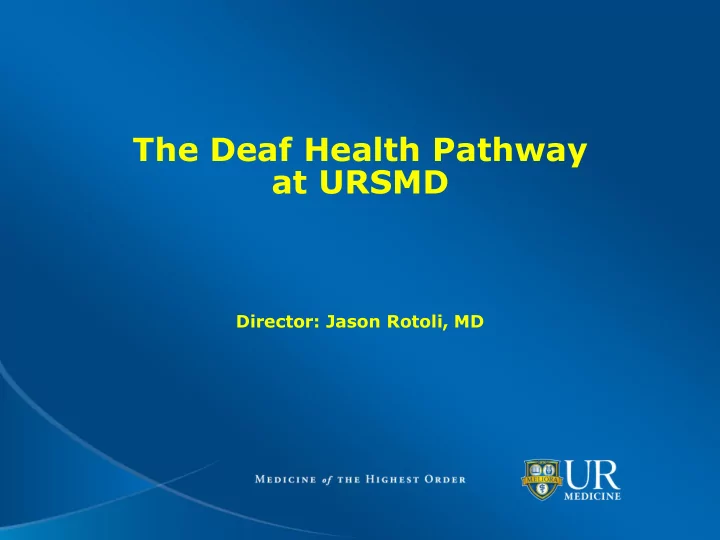

The Deaf Health Pathway at URSMD Director: Jason Rotoli, MD
The Deaf Community Rochester Deaf in the Rochester Area • ~5,000 adults • Highest per capita in America Deaf Community is socially and medically marginalized • Little awareness by health providers • Few sources of accessible health information • Low literacy • Low health literacy • Inclusion in national datasets is unclear (linguistic exclusion)
The Deaf Health Pathway: Goals • Appreciate the health disparities between the Deaf community and the general population • Increase awareness of unique Deaf health needs within a medical system • Introduce successful community engagement strategies • Increase knowledge of resources available to Deaf patients • Provide opportunities for linguistic and cultural immersion • Prepare students to care for Deaf patients (and other minority groups)
Why You Should Join the DHP Culture Competency & Language Immersion • Cultural awareness of Deaf Community • History, Conflicts, Achievements, Challenges • American Sign Language • Linguistic conduit into cultural appreciation • Learn a new language (or improve your fluency) Care for underserved population • Develop skills that can be applied to other minority populations Become a community health advocate • Work with Deaf organizations on a variety of health issues
Years 1 & 2 Medical Humanities Seminar Series: Three Parts Deaf Health, Part 1 An Introduction to Deaf Language and Culture Seminar in Spring of 1st Year Deaf Health, Part 2 Immersion into Deaf Language and Culture Seminar in Fall of 2nd Year Deaf Health, Part 3 Medical Experience in Deaf Language and Culture Seminar in Spring of 2nd Year Completion of all 3 seminars is necessary to enroll in the Pathway Each Part is 2 hours weekly (1pm – 3pm) for 8 weeks
Years 3 & 4: DHP Elective • Four weeks (total); can be split (2+2) if needed • Focus on issues relating to disparities in Deaf health • Provides and experience in collaboration and interaction with the Deaf community • Focus on single domain or combination of several domains • New project or build on previous work • May work independently or in collaboration with other DHP students
Deaf Health Pathway: Project Elements Community Involvement • Partnership with Deaf organizations (e.g. projects, health education programs, community service) Research Project • Supervised by a faculty member • Community Education (Deaf Health Talks) • Develop and implement an educational healthcare module for a specific medical condition or circumstance relating to the Deaf population Interpreting Observership • Coordinated with URMC Department of Interpreting Services
Year 3 & 4: Elective Domains Clinical Experience • Work with physicians who treat Deaf patients • Develop clinical and cultural skills and knowledge about interactions with Deaf patients Supervised Community-based Project • 10 – 15 pages or equivalent OR Presentation & Summary • Build on work done in Deaf electives • Submitted by February 1 of final year Medical Sign Workshop (optional) • Provide more in-depth communication approaches in ASL • Schedule two meetings with DHP director for medical case based ASL instruction
DHP Elective Deliverables Proposal & Calendar • Identify a Mentor • Each student can identify a community or health mentor to meet regularly or use the director as their mentor for the project • Submit a Project Proposal to Dr. Rotoli and Katie Libby 8 weeks prior to start of elective • Should include: • Schedule with completion dates • Goals/Objectives • Contacts • Required resources (administrative support, materials, etc)
DHP Elective Deliverables Final Report or Project • Content will depend on nature of elective--agreed upon at start of elective • Due by February 1 st of Year 4
What will continue? ASL Classes and Training Field Trips • Rochester School for the Deaf • National Technical Institute for the Deaf • National Center for Deaf Health Research Precepting Opportunities at Various Health Settings • Deaf Friendly Clinics • Audiology • ENT Surgery • Health Clinic at RIT • URMC Urgent Care • SMH Interpreting
Silent Dinners In addition to Year 1/2 Seminars and Year 3/4 elective, DHP students will have the option to participate in “ Silent Dinners ” * • Monthly “voice - off” meals • Subsidized dinners in various settings • home, restaurant, community center, etc. • Interaction with members of the Deaf Community • Develop linguistic and cultural proficiency through environmental immersion • Expected participation of >50% of events * Developed in 2013 in response to student feedback
Deaf Health Pathway Certification Those who complete all elements of the Deaf Health Pathway prior to graduation will be recognized in several ways: 1. Provision of certificate upon graduation 2. Dean’s Letter 3. Transcripts Also: Skills you develop during your elective Residency Interviews – Diversity Milestone Curriculum Vitae
Interested? Please enroll in the Deaf Health Seminars when requested by the Medical Humanities Office. Students will be required to complete all 3 seminars to enroll in the Deaf Health Pathway. Contact the DHP Director: Jason Rotoli, MD Department of Emergency Medicine Jason_Rotoli@urmc.rochester.edu Contact the DHP Coordinator: Katie Libby Office of Curriculum & Assessment Katherine_Libby@urmc.rochester.edu Deaf Health Pathway Website http://www.urmc.rochester.edu/education/md/admissions/elective-pathway.aspx
Recommend
More recommend